| Listing 1 - 10 of 15 | << page >> |
Sort by
|
Book
ISBN: 0314012435 Year: 1993 Publisher: Saint-Paul West publishing Co.
Abstract | Keywords | Export | Availability | Bookmark
 Loading...
Loading...Choose an application
- Reference Manager
- EndNote
- RefWorks (Direct export to RefWorks)
Planning (firm) --- 519.8 --- Operational research --- Management science. --- 519.8 Operational research --- Management science --- Quantitative business analysis --- Management --- Problem solving --- Operations research --- Statistical decision
Periodical
Year: 1993 Publisher: Lisboa : Instituto Superior de Economia e Gestão,
Abstract | Keywords | Export | Availability | Bookmark
 Loading...
Loading...Choose an application
- Reference Manager
- EndNote
- RefWorks (Direct export to RefWorks)
Management science --- Industrial management --- Operations research --- Gestion --- Gestion d'entreprise --- Portugal.
Book
ISBN: 0134857070 9780134857077 Year: 1993 Publisher: Englewood Cliffs (N.J.) : Prentice Hall,
Abstract | Keywords | Export | Availability | Bookmark
 Loading...
Loading...Choose an application
- Reference Manager
- EndNote
- RefWorks (Direct export to RefWorks)
Management --- Operations research. --- Management science. --- Management --- Management science. --- Operations research. --- Führungstechnik. --- Lineare Optimierung. --- Operations Research. --- Gestion d'entreprise --- Gestion --- Recherche opérationnelle. --- Führungstechnik. --- Lineare Optimierung. --- Operations Research. --- Mathematical models. --- Mathematical models. --- Modèles mathématiques. --- Cas, Études de.
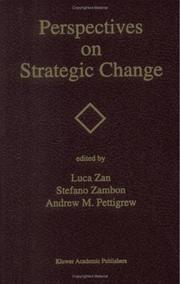
ISBN: 0585272905 0792393260 Year: 1993 Publisher: Boston ; Dordrecht ; London : Kluwer Academic Publishers,
Abstract | Keywords | Export | Availability | Bookmark
 Loading...
Loading...Choose an application
- Reference Manager
- EndNote
- RefWorks (Direct export to RefWorks)
Luca Zan, Stefano Zambon, Andrew M. Pettigrew This book has developed from an international research workshop organ ized by the Dipartimento di Economia e Direzione Aziendale, University of Venice, and the Centre for Corporate Strategy and Change, Warwick Business School, University of Warwick. The purpose of the workshop was to foster the growth of a European network of scholars and to help create a "European perspective" in studying strategic change. The ten chapters in this book were first presented in Venice in May 1991 and have been substantially revised since then. The ten commentaries on the chapters are in most cases substantial developments of the oral responses made at the workshop, as indeed is the final review chapter by Andrew Van de Ven. The theme of this book, the study of strategic change processes, remains as theoretically alive and empirically real in the 1990s as it did in the 1980s. For many organizations in the European and North American context, the 1980s was an era of radical change. In this respect there is a wide array of examples. Structural changes in old industries such as coal, shipbuilding, steel, and heavy engineering led to a great employment loss and the impoverishment of certain regional economies that had remained dependent on those industries. But it was not just the old industries that X INTRODUCTION experienced major change during the 1980s.
Organizational change --- Strategic planning --- International business enterprises --- Personnel management --- Management --- Business. --- Management. --- Business and Management, general. --- Management science. --- Case studies
Book
ISBN: 0585345880 0306444453 Year: 1993 Publisher: New York, NY : Springer,
Abstract | Keywords | Export | Availability | Bookmark
 Loading...
Loading...Choose an application
- Reference Manager
- EndNote
- RefWorks (Direct export to RefWorks)
Social scientists have not helped the working class make strategic deci sions. Unionists need to know how to carry on industrial conflict so as to provide concrete economic benefits for their members. Should unions strike or not strike? Should losses be avoided at all costs, or can unions afford to take chances? Does economism gut the class power of workers or provide a pragmatic strategy for increasing workers' wage gains? We can say with great confidence that workers should join unions; there is now an exhaustive and compelling literature demonstrating that union membership provides a wide variety of economic benefits. We can say that corporatist class compromises lower income but increase job security and overall employment. Beyond that, however, we cannot say much. In particular, we can do little to advise particular unions in partic ular fixed institutional and political environments how they should han dle the microtactics of individual confrontations. The United Farm Work ers do not need a speech about the miracle of the Swedish industrial relations system. They need to know whether they should strike or not strike, and how their tactics should change if rival Teamsters come into the field. Unfortunately, medical research often has to start with rabbits be fore it proceeds to humans, and so it is with research in industrial conflict. The realistic prospects of doing a large sample analysis of con temporary American wage settlements that simultaneously estimates the effects of union tactics and economic factors are poor.
Strikes and lockouts --- Wages --- Coal mining --- History --- Coal miners --- Business. --- Political science. --- Social sciences. --- Business and Management, general. --- Political Science. --- Sociology, general. --- Social Sciences, general. --- Management science. --- Sociology. --- Strikes and lockouts. --- History.
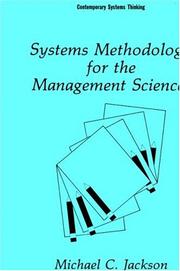
ISBN: 0306438771 1489926348 1489926321 Year: 1993 Volume: vol *6 Publisher: New York (N.Y.): Plenum
Abstract | Keywords | Export | Availability | Bookmark
 Loading...
Loading...Choose an application
- Reference Manager
- EndNote
- RefWorks (Direct export to RefWorks)
Beheerswetenschap --- Management science --- Qantitative business analysis --- Science de la gestion --- Systeemanalyse --- System analysis --- Systèmes [Analyse des ] --- Management science. --- System analysis. --- 65.012.4 --- Network theory --- Systems analysis --- System theory --- Mathematical optimization --- Quantitative business analysis --- Management --- Problem solving --- Operations research --- Statistical decision --- 65.012.4 Management. Directorate. Technique and methods of management --- Management. Directorate. Technique and methods of management --- Network analysis --- Network science --- GESTION --- THEORIE DE SYSTEME
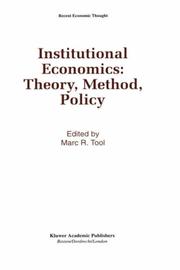
ISBN: 1280956704 9786610956708 0585296049 0792393465 Year: 1993 Publisher: Boston ; Dordrecht ; London : Kluwer Academic Publishers,
Abstract | Keywords | Export | Availability | Bookmark
 Loading...
Loading...Choose an application
- Reference Manager
- EndNote
- RefWorks (Direct export to RefWorks)
Institutional economics. --- Institutional economics --- Business & Economics --- Economic Theory --- 330 --- 338 --- AA / International- internationaal --- 330.00 --- Economics --- Economische en sociale theorieën: algemeenheden. --- Economics. --- Management science. --- Economic history. --- Economics, general. --- Methodology/History of Economic Thought. --- History of Economic Thought/Methodology. --- Economische en sociale theorieën: algemeenheden

ISBN: 0486677230 Year: 1993 Publisher: New York Dover
Abstract | Keywords | Export | Availability | Bookmark
 Loading...
Loading...Choose an application
- Reference Manager
- EndNote
- RefWorks (Direct export to RefWorks)
Operations research --- Recherche opérationnelle --- Mathematics --- Mathématiques --- lineaire programmering --- mathematische modellen, toegepast op bedrijfsleven --- operations research --- -Operational analysis --- Operational research --- Industrial engineering --- Management science --- Research --- System theory --- -Mathematics --- Recherche opérationnelle --- Mathématiques --- Operational analysis --- Algèbre linéaire --- Algebras, Linear --- Analyse mathématique --- Mathematical analysis --- Informatique --- Algèbre linéaire --- Analyse mathématique
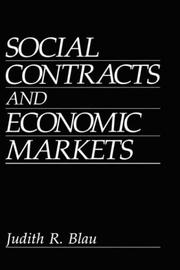
ISBN: 0306443910 9786611043032 1281043036 0585281874 Year: 1993 Publisher: New York, New York ; London : Plenum Press,
Abstract | Keywords | Export | Availability | Bookmark
 Loading...
Loading...Choose an application
- Reference Manager
- EndNote
- RefWorks (Direct export to RefWorks)
The thesis of this book is that people enter into social contracts because they are different from one another and have incentives to cooperate. In economic life, people have identical interests—namely, their own se- interests—so they have an incentive to compete. The social worlds that we create, or map, and those that are already mapped for us are increasingly complex, and thus the tracking of rationality is not so straightforward, although it is everywhere evident. In a sense, this book grew out of two questions: Why hasn't the United States had a second revolution? Or is the revolution yet to come? Many have discussed the current crises that confront contemporary society, such as great economic inequalities, poverty, the declining quality of jobs, the growing power of corporate elites, and racial antago nisms. I attempt to understand these problems in terms of the radical restructuring of social life by economic and spatial forces. My specula tive thesis is that social organizations must reinforce social contracts and nurture the opportunities for them to be forged. However, contemporary organizations, particularly economic ones, have internalized the princi ples of economic markets, thereby inducing competition and easing out cooperation. In defining social contracts, I draw from Rousseau and also from Marx and his analysis of use value. One hopes that new organiza tional forms based on principles of democracy and community will evolve. In a diverse, multicultural society, this requires great mutual understanding and cooperation and the recognition of differences.
Markets. --- Social contract. --- Social exchange. --- Social structure. --- Sociology --- Philosophy. --- Markets --- Social contract --- Social exchange --- Social structure --- Marchés --- Contrat social --- Echange social --- Structure sociale --- Sociologie --- Philosophy --- Philosophie --- EPUB-LIV-FT SPRINGER-B --- Business. --- Management science. --- Political science. --- Sociology. --- Business and Management. --- Business and Management, general. --- Political Science. --- Sociology, general.
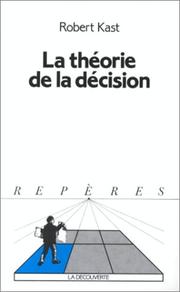
ISBN: 2707122114 9782707122117 Year: 1993 Volume: 120 Publisher: Paris La Découverte
Abstract | Keywords | Export | Availability | Bookmark
 Loading...
Loading...Choose an application
- Reference Manager
- EndNote
- RefWorks (Direct export to RefWorks)
Besluitvorming --- Besluitvormingsanalyse --- Besluitvormingsprocessen --- Deciding --- Decision analysis --- Decision making --- Decision processes --- Decision-making --- Décision [Prise de ] --- Décision [Théorie de la ] --- Making decisions --- Management decisions --- Management--Beslissingen --- Management--Besluitvorming --- Management--Decision making --- Prise de décision --- Théorie de la décision --- Statistical decision. --- AA / International- internationaal --- 305.6 --- Risicotheorie, speltheorie. Risicokapitaal. Beslissingsmodellen. --- Prise de décision --- Statistical decision --- Decision problems --- Risicotheorie, speltheorie. Risicokapitaal. Beslissingsmodellen --- Game theory --- Operations research --- Statistics --- Management science
| Listing 1 - 10 of 15 | << page >> |
Sort by
|

 Search
Search Feedback
Feedback About UniCat
About UniCat  Help
Help News
News